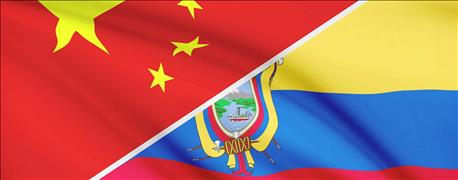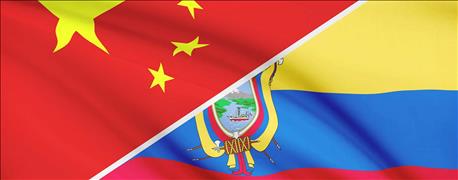
by Ting Shi and John Quigley
As Donald Trump weighs plans to tear up trade deals and deport illegal migrants from Latin America, Chinese President Xi Jinping is moving swiftly to reset relations in America’s backyard.
Xi returned from a Latin American swing last week having lavished Ecuador with $10 billion in energy and infrastructure deals, and bestowed Ecuador and Chile with China’s highest diplomatic status. He told Peru’s Congress relations were “standing at a new historical starting point.” While attending a summit in Lima with his lame duck U.S. counterpart, Barack Obama, he cast China as the region’s most eager trade advocate.

As Donald Trump weighs plans to tear up trade deals and deport illegal migrants from Latin America, Chinese President Xi Jinping is moving swiftly to reset relations in America’s backyard. (Photo: Niyazz/Thinkstock)
The Chinese leader’s trip highlighted how Trump’s surprise election win was tipping the geopolitical scales even before the Republican takes office with his “America First” platform. Until the vote, China had grappled with how to advance its more than 15-year foray into the traditional U.S. sphere, as its demand for commodities slows and left-wing political allies face setbacks in the region.
Now China finds itself in position to become Latin America’s primary growth driver, increasing its chances of surpassing the U.S. as the region’s largest trading partner. Trump, meanwhile, is vowing to crack down on immigration from places like Mexico and withdraw the U.S. from the 12-nation Trans-Pacific Partnership free trade pact, which includes Chile, Mexico and Peru.
LatAm/Caribbean-China Trade (2010-14) Exports to China Share Imports from China Share Iron ore, concentrates 19% Telecoms equipment 9.7% Soy, other oil seeds 18% Data-processing machines 3.8% Copper 12% Ships 3.3% Crude oil 11% Optical instruments 3.3% Copper ore, concentrates 9.6% Petroleum products 2.3% - Source: UN Comtrade; Boston University Global Economic Governance Initiative
“The train has left the station,” said Kevin Gallagher, author of “The China Triangle: Latin America’s China Boom and the Fate of the Washington Consensus.” “As China exhibited last week, the Trump shock presents a period for China to accelerate its Latin American ties as it may offer more and better trade deals along with more financing with less strings attached.”
Improving ties with China was a “smart card to play” if the region’s governments wanted to gain leverage with the incoming U.S. administration, said Gallagher, a professor of global development policy at Boston University.
Xi signed more than 40 deals -- spanning agriculture, energy, finance, infrastructure, technology, tourism and other areas -- during his week-long visit to the region, his third since becoming president in 2013. He upgraded Ecuador and Chile to “comprehensive strategic partnerships” and expanded trade deals with Chile and Peru, the latter granting him a congressional medal of honor.
Peruvian President Pedro Pablo Kuczynski, who in September chose China for his first overseas trip, told Xi that he wanted to team up against protectionism. “China is the most important country in the Asia-Pacific region, as well as the biggest market for Peru’s exports. It has become the engine for world economic growth,” Kuczynski told China’s state broadcaster in an interview before the meeting.
A delegation of 35 Chinese entrepreneurs from banking, construction and telecommunications expressed interest in investing in Panama’s energy and port sectors after concluding a visit to the Central American country Friday, according to the official Xinhua News Agency. Panama is currently one of 22 states that maintain diplomatic ties with Taiwan, instead of China.
Chinese trade with Latin America has ballooned more than 20-fold over the past decade, reaching $237 billion last year, Xinhua said. That compares with U.S. trade of $268 billion with the region. China and ministers from the region agreed at a meeting in Beijing last year to increase trade to $500 billion within a decade.
‘Honest Conversation’
Council of Americas Vice President Eric Farnsworth, whose group represents U.S. business interests in the region, called views of China’s and the incoming U.S. administration’s commitment to Latin America “deeply contrasting.” “The perception is that we’ve changed track and that policies will begin to reflect that,” Farnsworth said.
Still, China’s focus on Latin America as a source of raw materials -- including iron ore, oil and soybeans -- does little to promote industrialization in the region and has made it vulnerable to the country’s current slowdown. The political and economic turmoil engulfing Venezuelan President Nicolas Maduro, a key Beijing ally, has shown China’s need to diversify its relationships in the region.
“A reset of the China-Latin America relationship is now long overdue,” said Matt Ferchen, head of the Carnegie–Tsinghua Center for Global Policy’s China and the developing world program in Beijing. “A reset would involve a real, honest and probably difficult conversation about what kinds of trade, investment, financial and diplomatic relations would truly contribute to Latin American and Chinese development at this stage.”
Stability, Superfoods
A Chinese Ministry of Foreign Affairs policy paper on the region released last week called for greater trade in services, e-commerce and higher-value goods. Chinese companies should align their activities with local needs to “enhance their capacity for independent development,” it said. The report urged greater outreach between political parties “to further enhance mutual understanding and trust.”
Ran Jiao, head of mergers and acquisitions for LongRun Tea Group Co., which specializes in food and health products, touted the need for stability in the aftermath of Trump and Brexit on the sidelines of the Asia-Pacific Economic Cooperation summit in Lima.
“We can guess all we want about Trump, but who knows?” said Jiao, who was looking for agricultural deals in the region, especially in Peruvian “superfoods.” “Stability is the main question.”
Xi also struck an agricultural theme while explaining China’s commitment to APEC, noting his fondness for sweet potatoes, which originated in Latin America.
“The vines of a sweet potato may stretch in all directions, but they all grow out of its roots,” Xi said in a Nov. 19 speech. “China, with its root in the Asia-Pacific, will continue to contribute to its development and prosperity.”
--With assistance from Ben Bartenstein.
To contact the reporters on this story: Ting Shi in Hong Kong at [email protected]; John Quigley in Lima at [email protected]
To contact the editors responsible for this story: Daniel Ten Kate at [email protected]
Brendan Scott
© 2016 Bloomberg L.P
About the Author(s)
You May Also Like




